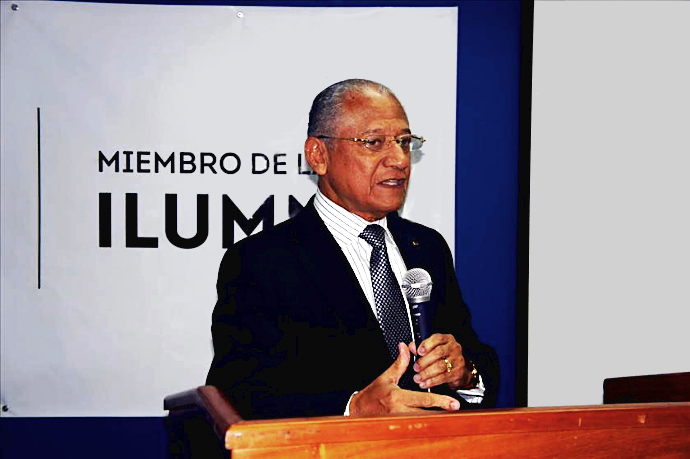Five years ago Oydén Ortega Durán, the former Supreme Court magistrate, was accused in the bribery scheme in a complaint to the National Assembly’s Credentials Committee. Ortega, who came to prominence out of the PRD ranks, was promptly let off by the Panameñista-dominated committee without any real examination or investigation. But now the elder Ortega’s son, Oydén Ortega Collado, and the ex-magistrate’s secretary, Claudia Purcait (also of a prominent PRD family), have been found guilty of influence trafficking for the same circumstances, in the regular courts. Supreme Court photo.
Ex-magistrate’s secretary and son guilty of selling a court decision
by Eric Jackson
Inflation in the cost of bribery might just ruing the game for everyone who pays it.
A Chiriqui cattle rancher in a property dispute wanted to appeal his case before the Supreme Court. The rancher, César Guillermo Alvarado Taylor, was representing his family company with respect to land that he said was his mothers’, in an argument with a rival company with respect to eight parcels of land. Alvarado was going broke and needed to win this case to stay in business. He got his appeal, lost in the civil chamber, then moved for a reconsideration. That would have in large part been up to magistrate Oydén Ortega Durán.
Then appeared Oydén Ortega Collado, the magistrate’s son, who offered to get the reconsideration for a $20,000 payment. Alvarado paid, got back into court, and found that if he wanted to WIN that case, it would cost another $250,000. Which he didn’t have. He dropped the litigation, and complained against the elder Ortega.
However, criminal allegations against high court magistrates are not heard in the ordinary courts, but by the National Assembly’s Credentials Committee, and if they progress perhaps by the entire legislature. Since the 1989 US invasion, with few exceptions, there has been a non-aggression pact among the political parties and between the high court and the Credentials Committee. ‘You don’t investigate us, we don’t investigate you. Or if we do, we throw the case out over some technical point.’
Ricardo Martinelli broke that pact with respect to the preceding PRD administration of Martín Torrijos. Martinelli turned the theoretical legislature-appointed comptroller general and attorney general into his personal rubber stamps, and would send his tourism minister, Salo Shamah, around to the high court with orders. Panama’s justice system has limped from scandal to scandal since then, without a definitive break from nor return to the old tacit nonaggression customs.
The Credentials Committee apparently was looking at something “restorative” in 2017, when Alvardo filed his complaint, and 2018, when a Panameñista-dominated committee shelved that complaint without an investigation.
In the ordinary courts, after much delay and at greater personal risk to himself, Alvarado got a better hearing. He had, after all, admitted to the crime of paying a bribe. But he had videotapes of one of the exchanges being made, he recorded some of the WhatsApp conversations, he had records of calls to and from his own phone, and it turned out that the money left a documentary trail that went from the younger Ortega, through his dad’s secretary and to the magistrate himself.
And on the evening of this past March 11, the trial court found Oydén Ortega Collado and Claudia Purcait guilty of influence peddling. Sentencing is set for March 25.
We can only imagine what sorts of appeals and maneuvers will follow that, but the evident trend is that the new female-majority high court has the votes to abandon some old ways. What we don’t have is a good indication that the legislature and its key committee intend any sort of change on their part. To the contrary, actually.
Contact us by email at fund4thepanamanews@gmail.com
To fend off hackers, organized trolls and other online vandalism, our website comments feature is switched off. Instead, come to our Facebook page to join in the discussion.
These links are interactive — click on the boxes













